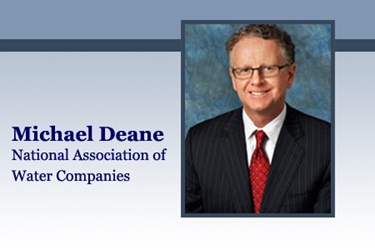NAWC: 'Public Or Private' Is About Solutions, Not Showdowns

The following was addressed to Water Online’s editorial staff, which invites, appreciates, and respects varying perspectives on the topics we cover. It was submitted for publication by Michael Deane, executive director of the National Association of Water Companies (NAWC).
To the editor:
I read with great interest Water Online’s August 17 article “Public, Private Showdown: Which Water Utility Model Is Best?” which reported on the soon-to-be-released findings of a recent study examining public and private utility models. “Which are more effective?” the article asks. The answer isn’t black or white. While the private water industry would certainly agree with some of the study’s observations, such as the private sector’s strong record of compliance, the truth is that this narrative starts with the wrong premise. The water challenges this nation faces are significant and it requires a holistic approach where the public and private sectors work together — not as opposing forces.
The article also included information from the study that needs correction. First, the piece implied that private utilities have little incentive to conserve. This couldn’t be further from the truth. Private water companies promote water conservation every day and have robust conservation programs that include customer education, free retrofit fixtures, rebate and incentive programs, and leak detection kits to name a few. These are things all well-managed utilities should be doing. Being a steward of water is critical for all of us, whether public utility, private utility, or the customer.
Secondly, the article quotes Atlantic CityLab statements that confuse the term “tiered rate structure” by implying it pertains to reduced rates for low-income households. This is not correct. Tiered rate pricing is primarily about conservation, not household income. The idea is simple — price is determined on the amount of water a customer uses, rewarding those who use less. That said, many private utilities do in fact have programs designed specifically for low-income households.
The reality is that there is no “showdown” between public and private water utilities. It’s up to individual communities to explore all options including private water companies that have been providing quality service to American communities for well over 200 years.
